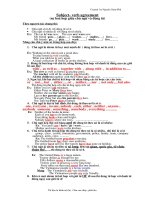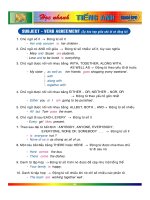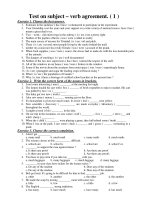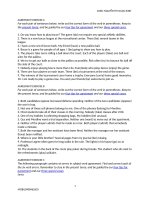SUBJECT VERB AGREEMENT
Bạn đang xem bản rút gọn của tài liệu. Xem và tải ngay bản đầy đủ của tài liệu tại đây (341.83 KB, 39 trang )
SUBJECT-VERB
AGREEMENT
STRATEGIES FOB SUBJECT-VERB
AGREEMENT ITEMS
ASK YOURSELF THESE QUESTIONS:
1. Is the noun a collective noun? Is it
considered a unit? If so, is the verb
singular?
INCORRECT [The committee are
meeting again on Monday morning.]
CORRECT The committee is meeting
again on Monday morning.
2. Is the noun a collective noun that refers to
single, separate elements? Is it considered
plural? If so, is the verb plural?
INCORRECT The police is currently
investigating the situation.
CORRECTS The police are currently
investigating the situation.
3. is the noun ending in —s considered singular?
if so, is the verb singular?
INCORRECT [The news have not been good
lately.]
CORRECT The news has not been good lately.
4. is there a phrase that separates
the subject from the verb? If so, have
you found the verb? Have you found
the subject of that verb? Do they
agree?
INCORRECT [The price of our
goods are lower than that of our
competitors.
CORRECT The price of our goods is
lower than that of our competitors.
1. We have (A) interviewed
many people who is (B)
interested in the job we have
(C) been advertising in the
trade newsletter that is (D).
distributed so widely.
Newsletter (n) a printed
report containing news of the
activities of a club or
organization that is sent
regularly to all its members
To distribute sth (to / among
sb/sth) to give things to a large
number of people; to share sth
between a number of people:
Ex: The organization
distributed food to the
earthquake victims
2. My staff has (A) contacted
a group of doctors that are (B)
involved in research and
development efforts that are
(C) so greatly needed by
children who suffer (D) from
this disease.
To be/To get involved (in sth)
taking part in sth; being part
of sth or connected with sth:
to be / become / get involved
in politics
Effort (to do sth) an attempt
to do sth especially when it is
difficult to do:
a determined / real / special
effort to make an effort
To suffer (from sth) | To suffer
(for sth) to be badly affected
by a disease, pain, sadness, a
lack of sth, etc.:
Many companies are suffering
from a shortage of skilled
staff.
Disease (n) an illness affecting
humans, animals or plants,
often caused by infection
3. Although mathematics was
(A) never easy for him when
he were (B) younger, he’s glad
he has chosen (C) to take
some classes since the
university requires (D) him to
do so.
4. The results of the research
is (A) considered satisfactory,
even though there are (B)
complaints about how long it
has (C) taken to compile the
data and about how much
money was (D) spent.
Satisfactory (adj.) good
enough for a particular
purpose
SYN acceptable:
a satisfactory explanation/
answer
To compile to translate
instructions from one
computer language into
another so that a particular
computer can understand
them
5. The personal computers
that were (A) ordered last
week have (B) already arrived
and are (C) being installed by
the technicians who has (D)
the most training.
6. The media have (A) been
investigating facts that were
(B) collected by an
astronomer who claims (C)
that astrophysics are (D) full
of errorneous facts.
The media [U+sing./pl. v.]
the main ways that large numbers
of people receive information and
entertainment, that is television,
radio, newspapers and the
Internet:
the news / broadcasting / national
media
To investigate (v) to carefully
examine the facts of a
situation, an event, a crime,
etc. to find out the truth about
it or how it happened:
The FBI has been called in to
investigate.
Astronomer (n) a scientist
who studies astronomy (the
scientific study of the sun,
moon, stars, planets, etc.)
To claim to say that sth is true
although it has not been
proved and other people may
not believe it
Astrophysics (n) the scientific
study of the physical and
chemical structure of the
stars, planets, etc.
Erroneous (adj.) not correct;
based on wrong information:
erroneous conclusions/
assumptions
7. My family is (A) planning a
visit to the United States,
which have (B) issued them
visas that are (C) good for six
months and expire (D) by the
end of the year.









